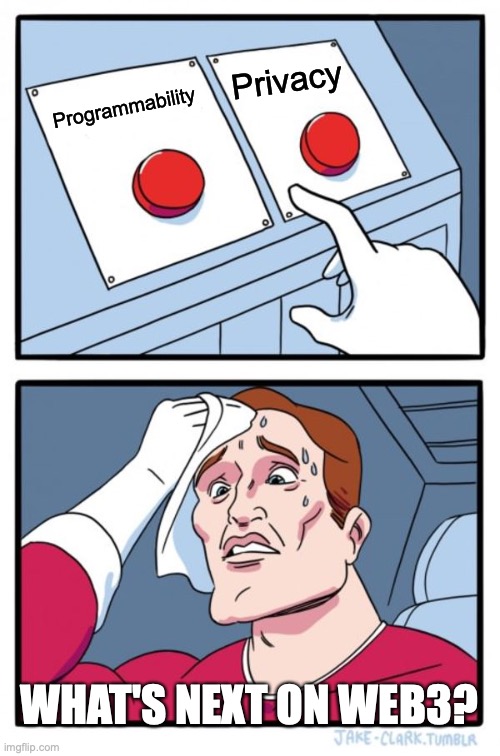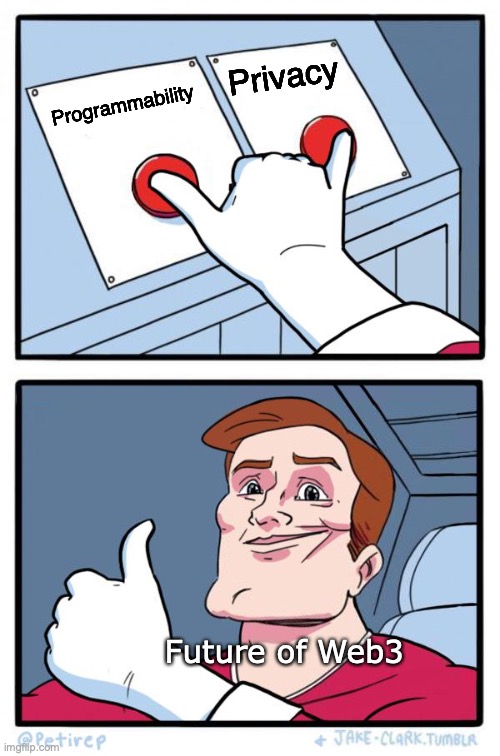Why Privacy?
In the original Bitcoin whitepaper, Satoshi Nakamoto tried to establish transactional privacy into blockchain, however, limited by technology available back in the days - he suggested, “a new key pair should be used for each transaction”, which was rendered as unfeasible by what we have on blockchains today.
In 2013, Ethereum was conceived and released in 2015, which implements the ability to execute state transitional logics in a decentralized manner (the Smart Contracts). About the same time, Monero started with stealth addresses and transaction privacy. In 2016, Zcash was born with zero-knowledge proofs and bring private transactions.
However, the two tracks of blockchain development took a different ride. The smart contract idea was widely developed: better understanding of smart contract security (aftermath of the DAO attack), the ability to execute fast, cheap and scalable with different consensus mechnism, composability and interoprablity, multi-chain system and decentralized bridges between blockchains. We have built decentralized token exchanges, we have invented NFTs, we have structred DAOs, we have introduced the idea of DeFi, GameFi, SocialFi and much more. While, not much has changed in the privacy aspect of blockchain.
At the time of writing this, in mid 2022, shitcoins and worthless forks of DeFi protocols are fading into history. Returns on DeFi is turning rational and realistic. NFTs are trading at high volume but confuse some (maybe most) people to understand the underlying value within. Afterall, why paying thousands of dollars or millions for a JPEG receipt? At the same time, despite the hard efforts put in by the community on SocialFi and GameFi on developing good products, it is still hard to distinguish good GameFi projects to Ponzi Scheme. We seems to be stuck in a cycle of innovations and trying to explore a new problems to be solved. Well... to more fair, there are countless problems in Web3 to be solved but building good products that solves these problems remains to be a challenge. We are expecting the next generation of killer DApp on Web3.
For certain, people have different answers to this question, our answer can be illustrated by the memes below.


Still, its pretty abstract. Let's break it down into some use cases.
- DeFi: transactions and holdings of an account should be private! No more MEVs and front-running.
- NFTs: NFTs are interesting peices, the collectors can be private while the art remains public. Such approach can be applicable to pieces with estalbishment of value.
- SocialFi: Following the NFT idea, contents of NFTs can also be private. Imagine a movie producer release a movie as an NFT, while whoever paid to a smart contract can gain access to the file. Furthermore, if we make a patronage community, for users to schedule periodic payments to a contract, and contiously gain access to content throughout the period of subscription. Many more model can be explored. The sky is the limit.
- Identity Aggregator: allow user to privately aggregate address for better optimized trading strategy; to calculate DeFi reputation; to bind on-chain identity to social media accounts etc.
- Web2 Style applciations: tons of Web2 style applications will find their way pretty comfortable with Web3 infrastructure. On a full-fledge platform, Web3 technology is easy to develop, easy to maintain and cheap on cost for applcaition developers. We would launch a product called KiwiSign as a decentralized legal document e-signature platform to start with.